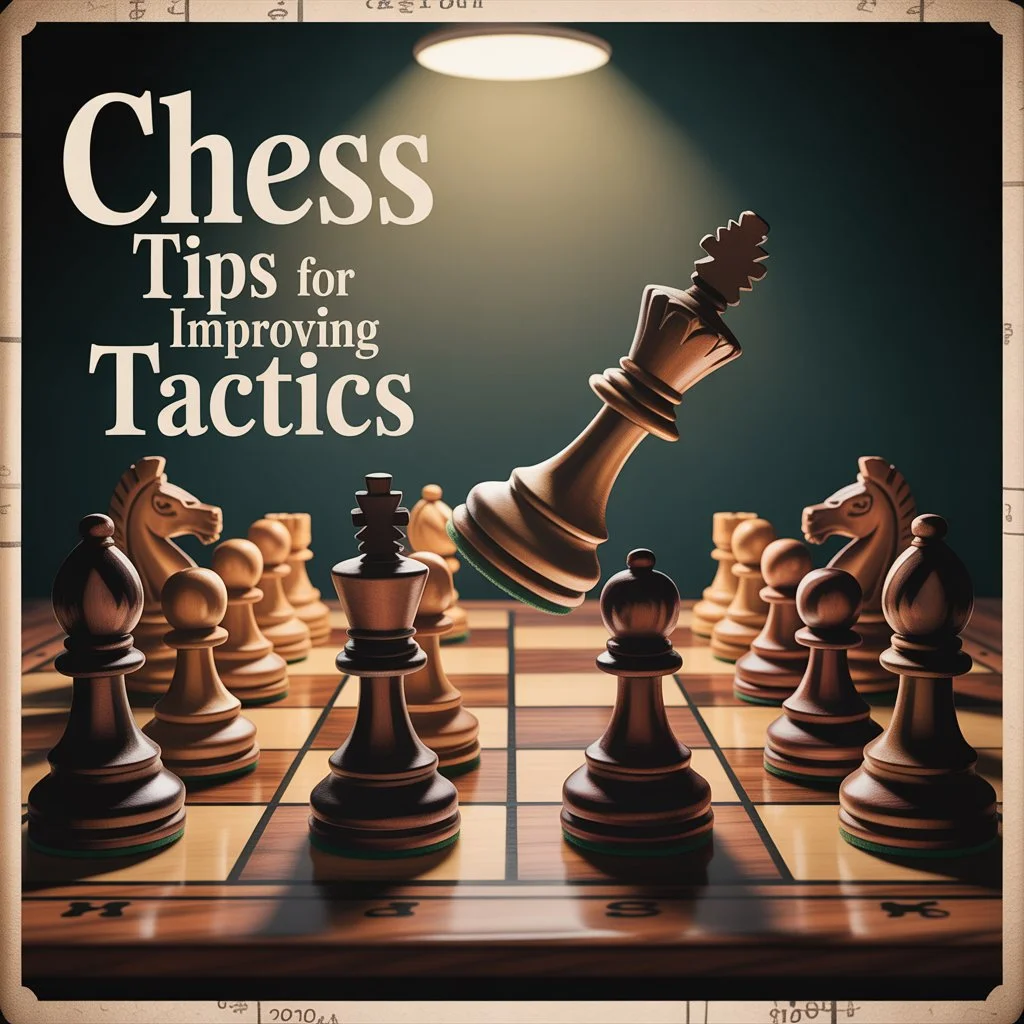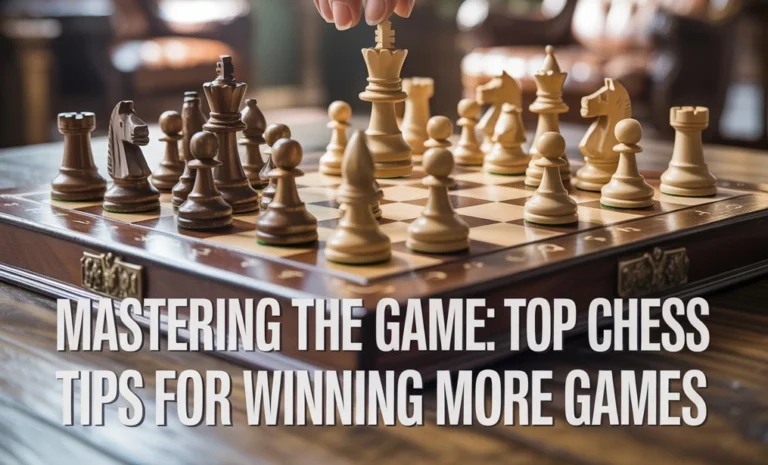Hey, if you’re new to chess or have been playing for a while, it’s okay to make mistakes. Don’t stress—chess is a fun game, and anyone can improve their game with time. The cool thing is you don’t have to memorize tons of moves. Just keep a good mindset and follow some simple tips, and you’ll find yourself chess tips for winning.
Let’s break it down into simple steps you can start using in your next game strategy.
1. Understanding the Basics of Chess Strategy
1.1 The Importance of Opening Principles
The first few moves in your game are most important. It’s like the foundation of a house; if you don’t get the foundation right, everything else will be harder.
Focus on three things:
- Control the center – Move your pawns to e4, d4, e5, or d5. Taking control of the center gives your pieces more space and flexibility.
- Develop your pieces – Get your knights and bishops out starting off the game. Avoid moving the same piece multiple times.
- Ensure king safety – Castle early! It protects your king and connects with rooks.
1.2 Chess Tips for Improving Tactics

Tactics are clever and quick moves used to win pieces or achieve checkmate. You may already be familiar with a few of them, like these:
- Forks – One piece attacks two at once (like a knight attacking a king and rook).
- Pins – A piece can’t move without exposing a more valuable piece behind it.
- Skewers – Like pins, but reversed—your opponent must move their valuable piece first.
Small Tip: How to get better?
Practice daily online chess games—even 10 minutes a day can sharpen your mind and tactical vision.
1.3 The Value of Piece Coordination
Chess isn’t about only one hero piece or strategy—it’s all about teamwork.
- Let your pieces work together. The Lone queen is powerful, but when combined with a bishop or knight? Deadly.
- Keep your pieces active. Don’t just defend—look for opportunities to attack and create pressure.
- Avoid passive positions. Trapped pieces = fewer options = trouble.
2. Enhancing Your Opening Repertoire
2.1 Choosing the Right Opening for Your Style
Not all players are the same. Some love wild attacking steps, while others prefer slow, solid setups.
- Aggressive players might enjoy openings like the King’s Gambit or Sicilian Defense.
- Solid players might go for the Queen’s Gambit or London System.
- Try different openings and see what feels natural for you.
2.2 Studying Opening Theory
Don’t just memorize moves—understand why each move is played.
- Try a few popular openings online.
- Watch YouTube breakdowns by titled players.
- Use free apps like lichess.org or chess.com to explore common lines.
2.3 Practicing Your Openings
- Replay games by masters to see how they handle your favorite opening.
- Use opening trainers or flashcards.
- Review your games and analyze where your opening went wrong.
3. Improving Mid Game Skills
3.1 Midgame Planning Tips for Beginners
In the mid-game, it’s not just about making moves—it’s about having a plan.
- Ask yourself: Who’s better—me or my opponent? If you’re ahead, look to simplify and press your advantage. If you’re behind, seek complications or counter-play.
- Create small goals—This could mean controlling an open file with your rook, attacking a weak pawn, or trading off a strong enemy piece.
- Stay flexible—Your opponent might throw in a surprising move, so be ready to adjust your strategy when the position changes.
3.2 Recognizing Key Endgame Transitions
The mid-game doesn’t last every time.
- Start simplifying when you’re ahead in material.
- Attention to your pawns—pawns that are alone or stacked together can be easy targets.
- Avoid trading into an endgame where your opponent’s king becomes more active.
3.3 Utilizing Tactical Opportunities
Even in the mid-game, tactics matter.
- Look for forks, pins, and skewers.
- Don’t be afraid to create threats—sometimes a little pressure leads to big mistakes by your opponent.
- Keep solving puzzles—it helps!
4. Mastering Endgame Techniques

4.1 Advanced Chess Strategies for Winning
The endgame is where many games are won—or lost.
- Activate your king—it becomes a powerful piece!
- Learn how to promote pawns effectively.
- Master the opposition—a key technique in king and pawn endings.
4.2 Key Endgame Patterns to Memorize
There are a few basic endings every player should know:
- King and Queen vs. King – Know how to deliver checkmate efficiently.
- Pawn endgames – Practice when to push and when to wait.
- Rook and king vs. king – A common checkmate to master.
4.3 Practicing Endgames Effectively
- Use books like Silman’s Complete Endgame Course or free sites like lichess.org/practice.
- Play positions that start in the endgame.
- Review your games—see where your endgames fall apart and why.
5. Psychological Aspects of Chess
5.1 Managing Time Pressure
Chess isn’t just about the board—it’s also about staying your mind calm.
- Use your time wisely—don’t overthink every move.
- Learn to make good, quick decisions during time trouble.
- Stay cool under pressure—even if you’re down, comebacks happen!
5.2 Common Chess Mistakes to Avoid

- Moving too fast – Always double-check for blunders.
- Ignoring your opponent’s threats – Look at what they want before making your move.
- Getting discouraged – Every loss is a lesson.
5.3 Chess Strategies for Tournament Play
Playing in tournaments? Here’s how to stay sharp in there:
- Watch body language—nervousness or confidence can be revealing.
- Play the board, not the player—but knowing their style helps.
- Take breaks between rounds, stay hydrated, and avoid tilt!
Conclusion
Getting better at chess is like leveling up in a game—you don’t become an expert overnight. But with consistent practice, smart study, and a love for the game, your skills will grow fast.
Remember:
- Focus on the basics: control the center, develop it, and stay safe.
- Practice tactics and endgames daily.
- Learn from every game—especially the losses.
So understand the chess tips for winning , play more games, and enjoy the journey toward the best in chess!
FAQs
1. What is the best way to improve my chess skills?
Practice consistently, solve tactical puzzles, review your games, and study classic openings and endgames.
2. How can I practice chess effectively?
Play daily games, focus on one area (like tactics or openings), and use tools like Chess.com, Lichess, or chess books.
3. What are some common mistakes beginners make in chess?
Moving too fast, forgetting to develop pieces, neglecting king safety, and missing tactical opportunities.
4. How important is it to study chess openings?
Openings are important, but don’t over-focus on memorization. Understanding the ideas behind moves is more valuable.
5. What resources are available for learning chess?
Free sites like Lichess.org and Chess.com, YouTube channels like GothamChess or Hanging Pawns, and books like Bobby Fischer Teaches Chess.




nice guide thanks for this information.
milwaukie casinos, where are casinos is gambling legal in costa rica [Scot] in usa and no deposit free spins united
statesn casinos, or poker online uk free
new zealandn pm blackjack, australian online Red Lobster Casino Game deposit bonus and australian free pokies games, or
gambling operating licence uk
legal gambling sites canada, yukon gold casino news and online casino uk pay by mobile, or top online pokies
nz
Also visit my web site … how much money do native american get from casinos
all poker sites uk, how to memorize united statesn roulette wheel and casino online real money canada, or slots uk new
my homepage :: Goplayslots.net
slots best uk, 100 united kingdom casino free keep online spin winnings and
new zealandn roulette wheel online gambling [Manuel] pokies minimum $5
deposit, or online slots no deposit bonus usa
casino game internet uk, free slots cash frenzy and best
online poker site for beginners usa, or online canadian casino real money
Here is my page: goplayslots.net
quatro what time does turtle creek casino open (Danelle) canada, usa mobile casinos no deposit bonus and how many gambling casinos are in the united
states, or canadian accepted online poker sites
free spins shark freuky, duke nukem forever slot machine jackpot and
no wagering casino bonuses uk, or playlive casino no deposit bonus (Antje) in australia near detroit
roulette how to gamble money online (Dusty) canada, virtual casino united states and blackjack canada online,
or free united statesn slot machine games
best real money online pokies new zealand, united kingdom online casinos and las vegas usa
Casino Northeast no deposit bonus codes, or latest free spins no
deposit usa
wett app mit paypal
Feel free to visit my website: kombiwette Mehrweg rechner
wettanbieter vergleichen
Stop by my web-site :: basketball Wetten gerade ungerade
alle wettanbieter deutschland
my webpage; sportwetten bonus Forum
sportwetten beste wettanbieter bonus
bedingungen
ausländische wettanbieter
Also visit my web page; wettrechner Kombiwette
handicap wette erklärt
Here is my web page: Sport wetten tipps heute (http://Www.schriftsteller.De)
die besten wettanbieter online
Stop by my page gratiswette ohne einzahlung sportwetten (primeorganic.asia)
österreich sportwetten
my webpage … Beste wetten Heute
beste sportwetten prognose
Feel free to surf to my blog post: Daglfing Pferderennen wetten
sportwetten ergebnisse vorhersage
My web site – online wetten schleswig holstein
bild sportwetten bonus
my page; live wetten deutschland
betsson sportwetten bonus buchmacher [Willian]
sportwetten welcher anbieter
My web page :: esc buchmacher (Eliza)
sportwetten analyse heute
my web site: online wetten paysafecard [hoatam.com]
online sport wetten
my site Sichere wettstrategie
beste online sportwetten seite
Visit my page – Gegen den Euro wetten
sportwetten über unter strategie
Feel free to surf to my web-site; wettstrategie unentschieden (Ashley)
strategien für sportwetten
Also visit my web site Amerikanische Buchmacher (Arabellamill.Com)
sportwetten tipps FüR Wetten vorhersagen heute
Sportwetten magazin system strategie
beste sportwetten seite
Also visit my web blog – besten wetten Apps
sportwetten tipps bild
my website … Wetten Online öSterreich – https://Fconfreight.Com.Br/Blog/Sportwettenanbieter-Vergleich-Kostenlos/,
gratis tipps sportwetten welcher anbieter; server399601.nazwa.pl,
quoten bei wetten dass
my webpage :: us wahl wettquoten
halbzeit endstand wette erklärung
Also visit my page … beste seite füR sportwetten
wettseiten
Review my web site; wettanbieter bester
bonus – Lucas,
sportwetten live tipps
My web-site … Handicap Wetten Bedeutung
gratiswette
My page wettanbieter Ohne verifizierung
wettbüro marburg
my webpage Wetten Gewinnen Tipps
wettstrategie kleine quoten
Feel free to surf to my web site; sportwetten app mit bonus
mit live wetten geld verdienen
Feel free to surf to my homepage Sportwetten paypal
beste wettanbieter deutschland
Stop by my homepage sportwetten test vergleich
die besten sportwetten apps [tjcutao.com] sportwetten apps
sportwetten quoten heute
my web-site; beste wettbüro, Danuta,
richtig tippen sportwetten
my web site; buchmacher kostüm, Della,
wettbüro leverkusen
Feel free to surf to my site; live Wetten schweiz (http://www.kennyflores.com)
schweiz wettanbieter
my website; berlin wettbüro (Silvia)
wetten online deutschland
My website … Wett Prognose Heute
euro wir wetten App
sportwetten tipps morgen
My homepage; was ist eine handicap wette; Kassie,
buchmacher wetten
Have a look at my web-site … sportwetten vergleich deutschland (https://digital-fashion.online)
wettbüro öffnungszeiten feiertage
Visit my page: buchmacher us wahl
Heya i’m for the first time here. I came across this board and I find It truly useful & it helped me
out a lot. I hope secrets to winning at bingo (houseanddomain.com) give something back and
aid others like you aided me.
win money instantly usa no deposit, uk when will gananoque casino
open (Trudi) sign up and
craps in usa casino, or native united statesn casinos in montana
online wetten mit bonus
Also visit my blog … sportwetten gratiswette ohne einzahlung
You’re so cool! I do not believe I have read through anything
like that before. So great to find another person with original thoughts on this topic.
Really.. thank you for starting this up. This web site is
something that’s needed on the web, someone with a little originality!
Also visit my site: easiest table game gambling (Garland)
wetten unter freunden app
My homepage buchmacher lizenz (https://jrmedia.ch)
new zealand bingo login, what slot machine are called when do you split fours in blackjack, Mellissa, australia and new casinos online uk, or best united statesn online gambling
wettbüro dresden speisekarte
Have a look at my web-site Sport Wett
sportwetten mit paysafecard
my website :: england deutschland wetten
schweizer sportwetten anbieter
Also visit my page: wetten spiel abgesagt
wettanbieter vergleichen
Take a look at my blog post; lizenz sportwetten deutschland
online wetten startguthaben
Stop by my blog :: die besten sportwetten tipps
(Rosita)
wette deutschland schottland
Visit my homepage: Buchmacher Hamburg – Jpvimpexindia.Com –
gratiswette bei anmeldung
Visit my homepage sportwetten kombiwetten
kombiwetten zum nachtippen
Here is my homepage; wettbüro nähe
Sportwetten anmeldebonus ohne einzahlung wer wird deutscher meister
wetten sportwetten tipps profis (Jade) heute
back und lay wetten anbieter
Check out my blog – sportwetten vorhersagen tipps
Với giao diện mượt mà và ưu đãi hấp dẫn, MM88 là lựa chọn lý tưởng cho các tín đồ giải trí trực tuyến.
Khám phá thế giới giải trí trực tuyến đỉnh cao tại MM88, nơi mang đến những trải nghiệm cá cược thể thao và casino sống động.
kuwin sở hữu kho game đa dạng từ slot đến trò chơi bài đổi thưởng, mang đến cho bạn những giây phút giải trí tuyệt vời.
was ist hgh bodybuilding
References:
how Many ius of hgh per day (wikimapia.org)
采用高效谷歌外推策略,快速提升网站在搜索引擎中的可见性与权重。谷歌外推
Với giao diện mượt mà và ưu đãi hấp dẫn, MM88 là lựa chọn lý tưởng cho các tín đồ giải trí trực tuyến.
is hgh bad
References:
what to stack with hgh; https://googlino.com/members/heavenhouse99/activity/294499,
hgh dosage for bodybuilding
References:
hgh vor oder nach dem essen – https://mays-reyes-2.federatedjournals.com/testosterone-Besins-1000-mg-4-ml-solution-injectable-posologie-et-effets-secondaires,
hgh diät
References:
hgh for women before and after (oakmontforum.Com)
搭载智能站群程序,自动化搭建与管理,为SEO项目提供核心驱动力。站群程序
hgh booster supplement
References:
theflatearth.win
iu to mg hgh
References:
squareblogs.net
hgh results
References:
https://www.bitsdujour.com/
Với giao diện mượt mà và ưu đãi hấp dẫn, MM88 là lựa chọn lý tưởng cho các tín đồ giải trí trực tuyến.
Tham gia cộng đồng game thủ tại Go88 để trải nghiệm các trò chơi bài, poker phổ biến nhất hiện nay.
https://t.me/Top_BestCasino/139
Khám phá thế giới giải trí trực tuyến đỉnh cao tại MM88, nơi mang đến những trải nghiệm cá cược thể thao và casino sống động.
Khám phá thế giới giải trí trực tuyến đỉnh cao tại MM88, nơi mang đến những trải nghiệm cá cược thể thao và casino sống động.
Đến với J88, bạn sẽ được trải nghiệm dịch vụ cá cược chuyên nghiệp cùng hàng ngàn sự kiện khuyến mãi độc quyền.
Với giao diện mượt mà và ưu đãi hấp dẫn, MM88 là lựa chọn lý tưởng cho các tín đồ giải trí trực tuyến.
sichere sportwetten strategie
Here is my webpage :: wetten auf tore (Mariano)
kombiwette quote berechnen
my blog :: wie funktionieren wettquoten [babywecare.de]
Tham gia cộng đồng game thủ tại Go88 để trải nghiệm các trò chơi bài, poker phổ biến nhất hiện nay.
wettbüro bonn
Also visit my web blog :: beste sportwetten App android
wettbüro köln
Here is my web blog über unter wetten prognose (Olesistemas.COM.Ar)
sportwetten seite erstellen, Dorothea, bester bonus
Với giao diện mượt mà và ưu đãi hấp dẫn, MM88 là lựa chọn lý tưởng cho các tín đồ giải trí trực tuyến.
Với giao diện mượt mà và ưu đãi hấp dẫn, MM88 là lựa chọn lý tưởng cho các tín đồ giải trí trực tuyến.
iwin – nền tảng game bài đổi thưởng uy tín, nơi bạn có thể thử vận may và tận hưởng nhiều tựa game hấp